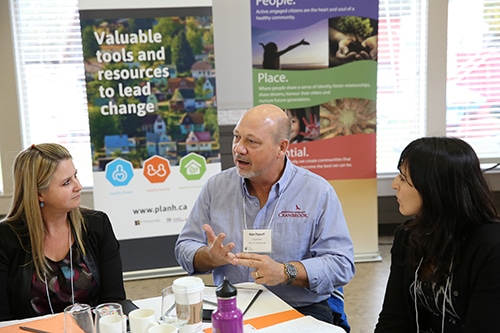Healthy community building happens in many different types of organizations and is fostered in a variety of professional contexts. That’s why bringing together multiple sectors to share insights in their collective journey can help address key health and well-being challenges.
Leaders in the Interior Health region gathered in Vernon on October 27, 2016 to celebrate and take stock of healthy community partnerships at the Interior Region Healthy Communities Forum. The forum was the final in a series of five forums taking place in each health authority region. Over eighty delegates participated in the day rich with dialogue, insights and connections.
The event was hosted by Interior Health and facilitated by BC Healthy Communities Society on behalf of the PlanH program. BC Healthy Communities set the stage by acknowledging that this work has been growing momentum for a long time. And in the last five years there has been a groundswell of new activity that has enhanced activities around healthy communities.
Facilitators Stacy Barter and Erica Crawford explained how the forums are an opportunity to take stock on what is making a difference and what impact collaborative efforts are having.
Click on the image above to enjoy the Interior Regional Forum photo gallery.
Healthy Community Partnerships: How far have we come?
The morning began with a welcome to Sylix Traditional Territory by Elder Lucy Louis had a powerful message about how she changed her habits to live a healthier lifestyle and now encourages others in her community to try to do the same. Opening speaker, Vernon Mayor Akbal Mund, said that, “building healthy communities is complex and needs partnerships ,” a point brought home by Debra Cannon, Interior Health Board member, who recognized local government’s contributions to creating strong partnerships with the health authorities.
Roger Parsonage and Lex Baas from Interior Health providedInterior Health’s Roger Parsonage, Corporate Director, Population Health and Lex Baas, Manager Health Promotion, provided further historical context and current successes that lead to improved health and wellness through health promotion and prevention. Parsonage underscored the importance of collaboration by saying, “We cannot do this by ourselves. We can only do so much, leadership needs to come from communities and community leaders.” Baas spoke to the provincial context by pointing out that people with chronic conditions (34% of population) consume 80% of healthcare budget. “This work requires all kinds of partners,” said Bass, “including strong engagement from nonprofits and citizens as well.”
Healthy Community Partnerships: What’s made a difference? What have we learned?
Two panels of short presentations followed. Speakers from panel one shared a diverse range of successes and experience covering climate action, collaboration constellations and growing local food in the Cariboo. Presenters from panel two discussed housing, homelessness, poverty reduction strategies and healthy community connections. See a full list of speakers and presentations at the end of this article.
Healthy Community Partnerships: Where Are We Now?
“This work requires all kinds of partners”– Lex Baas, Interior Health
The afternoon shifted the focus of the room to one of the most pressing issues of our time: climate change. Kerri Klein, BC Healthy Communities Learning and Innovation Specialist and Dr. Sue Pollock, Interior Health Medical Health Officer presented on health in the context of a changing climate. A review of how climate change effects health led quickly to the conclusion that health needs to be a central message in the climate change agenda.
Interactive table dialogues followed the presentation. Participants split up into eight rotating round-tables to discuss how climate change intersects with health issues including: healthy built environment, food security, age friendly communities, sustainability, energy and emissions planning, physical activity and active transportation, drinking water, social connectedness and resilience.
Healthy Community Partnerships: Where To Next?
The day concluded with a dialogue about what was discussed in the round-tables. Table leads described deep discussions about how to experiment and take action on tough issues and ways to share resources going forward. One participant commented that it was clear the healthy communities movement in the Interior region was now using a common language. Other participants suggested ways to continue collaborating and moving forward for a healthier British Columbia.
Presentations:
- BC Healthy Communities Presentation
- Building Healthy Communities in the Interior Region: Roger Parsonage, Corporate Director of Population Health, Interior Health & Lex Baas, Manager Health Promotion, Population Health, Interior Health
- Kelowna’s Healthy City Strategy: a partnership between City of Kelowna and Interior Health: Michelle Kam, Sustainability Coordinator, City of Kelowna
- A Coalition of Constellations: Okanagan Similkameen Healthy Living Coalition and Summerland Healthy Community Initiative: Joanne Malar, Program Coordinator, Summerland Recreation, District of Summerland, and member of the Summerland Healthy Community Initiative & Angelique Wood, Coordinator – Okanagan Similkameen Healthy Living Coalition
- Growing Local Food Systems in the Cariboo: Tatjana Lauzon, Public Health Dietitian, Interior Health, Chair Williams Lake Food Policy Council
- Building a Model of Change for Housing and Homelessness in Kamloops – The HomeFree Collective: Jen Casorso, Social and Community Development Supervisor – City of Kamloops
- Nelson at Its Best: Anna Purcell, Councillor, City of Nelson
- Safe Routes to School: Wendy Majewski, Transportation Demand Management Coordinator, City of Vernon
- Climate Change and Human Health: Local Implications and Actions: Kerri Klein, Learning and Innovation Specialist, BC Healthy Communities & Dr. Sue Pollock, Medical Health Officer, Interior Health
Graphic Notes:
Click on the thumbnail to see a larger version.
Resources:
- Okanagan Similkameen Healthy Living Coalition
- The Champlain Housing Trust
- Columbia Basin Rural Development Institute
- Nelson at its Best website
- Nelson Street Culture Collaborative article







